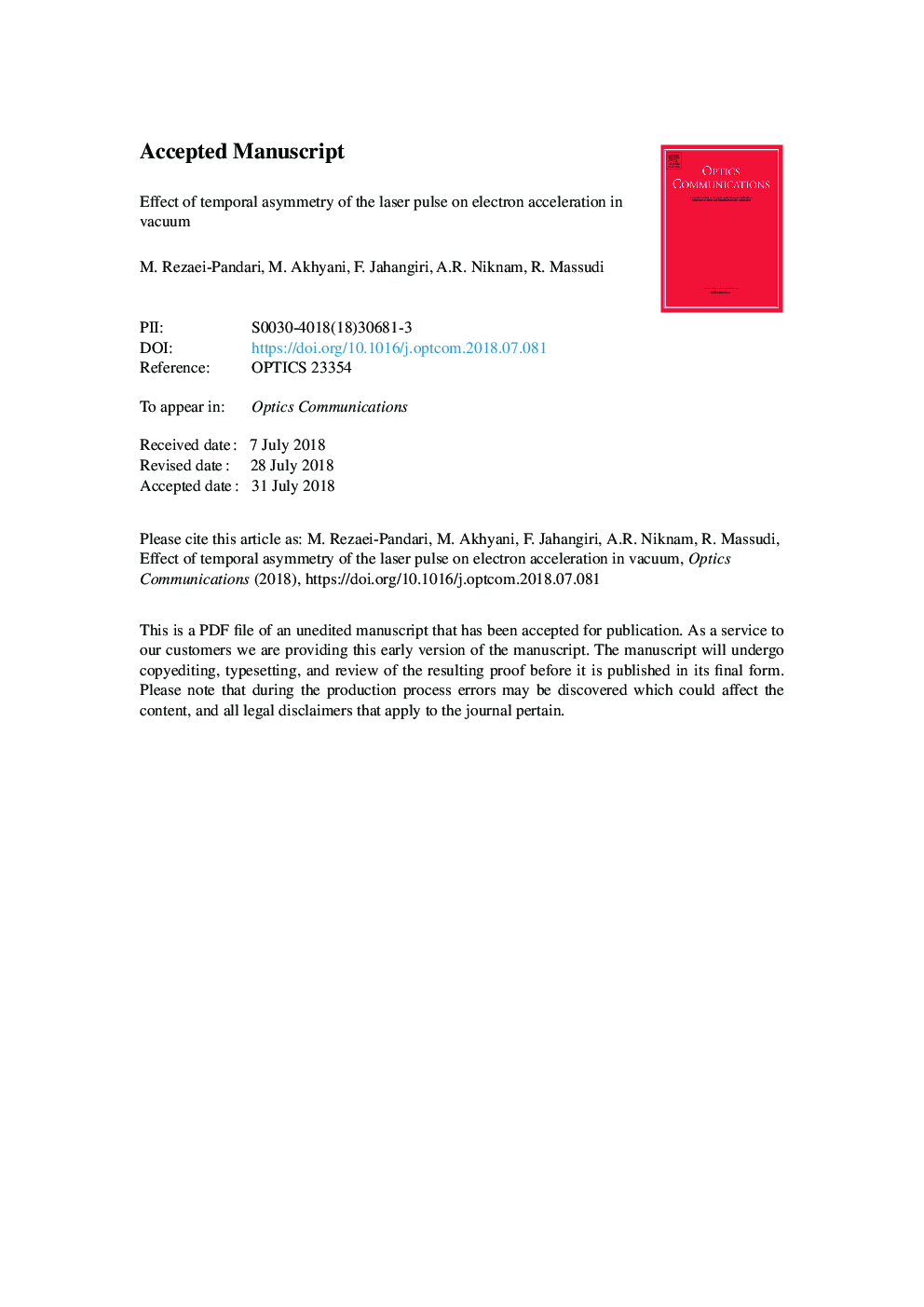| کد مقاله | کد نشریه | سال انتشار | مقاله انگلیسی | نسخه تمام متن |
|---|---|---|---|---|
| 7924490 | 1512494 | 2018 | 18 صفحه PDF | دانلود رایگان |
عنوان انگلیسی مقاله ISI
Effect of temporal asymmetry of the laser pulse on electron acceleration in vacuum
ترجمه فارسی عنوان
اثر عدم تقارن زمانی پالس لیزر بر شتاب الکترون در خلاء
دانلود مقاله + سفارش ترجمه
دانلود مقاله ISI انگلیسی
رایگان برای ایرانیان
کلمات کلیدی
00-01، 99-00، پالس لیزر، خلاء، الکترونی، شتاب،
ترجمه چکیده
ما پویایی الکترون را در پالس لیزر گاوسی بررسی می کنیم تا سهم پارامترهای زمانی را در مکانیزم شتاب لیزر خلاء ارزیابی کنیم. مطالعه عددی ما نشان می دهد که انرژی قابل توجهی از انرژی غیر صفر را می توان از طریق یک تزریق الکترون تحت کنترل فضایی کنترل کرد. علاوه بر این، بهینه سازی سه بعدی از زاویه تزریق الکترون، نشان می دهد که با استفاده از یک طرح تزریق جانبی، بالاترین میزان انرژی به دست می آید. ما همچنین وابستگی انرژی انرژی الکترون به قطبش لیزر را با جامع مقایسه تمام حالتهای قطبش ممکن مقایسه می کنیم. یافته شده است که حساسیت زمانی بین تزریق الکترون توسط قطبی شدن پالس لیزر تعیین می شود. علاوه بر این، نشان داده شده است که گرچه افزایش انرژی در پالس های لیزری خطی با قطبش خطی به حداکثر می رسد، پالس های لیزر دایره ای قطبی شده با طولانی تر نیز منجر به افزایش انرژی قابل مقایسه با حساسیت زمانی کمتر برای تزریق الکترون می شود. برای رسیدگی به امکان فنی روش شتاب در شرایط بهینه شده ذکر شده، یک راه اندازی تجربی پیشنهاد شده است.
موضوعات مرتبط
مهندسی و علوم پایه
مهندسی مواد
مواد الکترونیکی، نوری و مغناطیسی
چکیده انگلیسی
We explore the electron dynamics in a Gaussian laser pulse to assess the contribution of the temporal parameters to the mechanism of vacuum laser acceleration. Our numerical study reveals that a considerable nonzero energy gain can be achieved through a spatio-temporally controlled electron injection. Moreover, three-dimensional optimization of the electron's injection angle suggests that the highest energy gain is obtained by using a sideways injection scheme. We also present the dependence of the electron energy gain on the laser polarization by comprehensively comparing all possible polarization states. It is found that the temporal sensitivity of the electron injection is determined by the polarization of the laser pulse. In addition, it is shown that although the energy gain is maximized in linearly polarized short laser pulses, circularly polarized laser pulses with longer duration would also lead to comparable energy gains but with much less temporal sensitivity for electron injection. To address the technical feasibility of the acceleration procedure under the mentioned optimized conditions, an experimental setup is proposed.
ناشر
Database: Elsevier - ScienceDirect (ساینس دایرکت)
Journal: Optics Communications - Volume 429, 15 December 2018, Pages 46-52
Journal: Optics Communications - Volume 429, 15 December 2018, Pages 46-52
نویسندگان
M. Rezaei-Pandari, M. Akhyani, F. Jahangiri, A.R. Niknam, R. Massudi,
